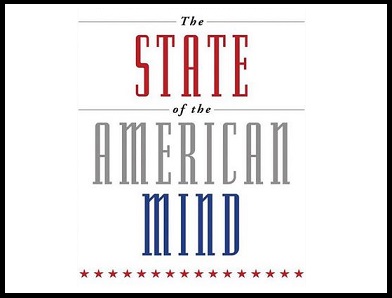Here are three excerpts from an interview by the Daily Caller’s Jamie Weinstein with Emory Professor Mark Bauerlein, who is one of the editors of a book that is a series of essays by 16 scholars titled The State of the American Mind:
What do you mean by the “American Mind” and how is its state?
For some 300 years, thinkers and commentators, writers and politicians, have talked about the American mind or the “American character,” the “American Scholar,” the “Philosophical Method of the Americans,” and other general terms for characteristic American attitudes and thoughts. It might be found in the hopes and expectations of Ben Franklin as a youth fleeing to Philadelphia to start his own life, or in the speech and behavior of common workers, which Walt Whitman believed best typified the new world citizen. In this sense, the American mind is a composite made up of the dominant, sometimes idealized, traits of our population.
…
We don’t have a single, overarching thesis of the nation at large. Our contributors focus on smaller phenomena, and they range across the political spectrum. But as they address different expressions of mental habits and outlooks — rising narcissism among the young, increasing entitlement behaviors among older Americans, feelings of offense voiced in media and education, ignorance of current events and civic backgrounds, etc. — a profile of deterioration begins to emerge. Taken together, they spell out a troubling national condition.
What worries you most about American society and culture today?
The first problem is ignorance. Too many Americans know little about American history and civics. The evidence comes from national tests and surveys, and I presume readers here are familiar with those results (which are announced with dreary predictability every year). The problem with not knowing what the First Amendment says or what Booker T. Washington argued is that people have thin grounds for exercising their sovereignty. They vote without knowing the issues, or they don’t vote at all. They judge American actions in the present without any knowledge of past actions (which provides a sound basis for judgment). They understand current leaders without comparing to the best and worst examples from before.
…
What are the consequences for our society from this low state of what you call the American mind? at the moment, America does remain the world’s only superpower and an economic leader. Can we maintain that if this cultural and societal trend continues?
When rates of dependency run this high, when so many people are disengaged from the civic sphere and don’t care about the American past, and when individualism runs more toward self-involvement than to responsible citizenship, we can’t think that American greatness will continue unless something changes. What made this country strong was a vigilant voting public and an entrepreneurial spirit. So long as we remained true to equal opportunity and the right to pursue happiness, we prospered.
Read the entire interview here.

